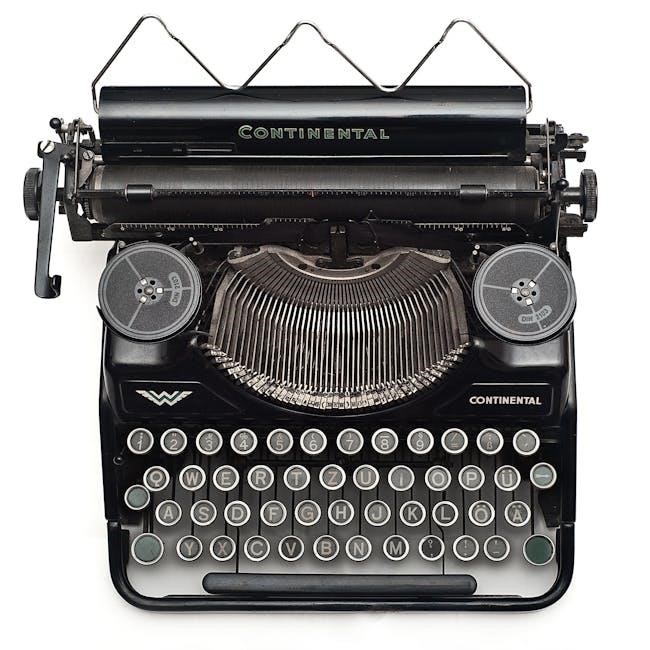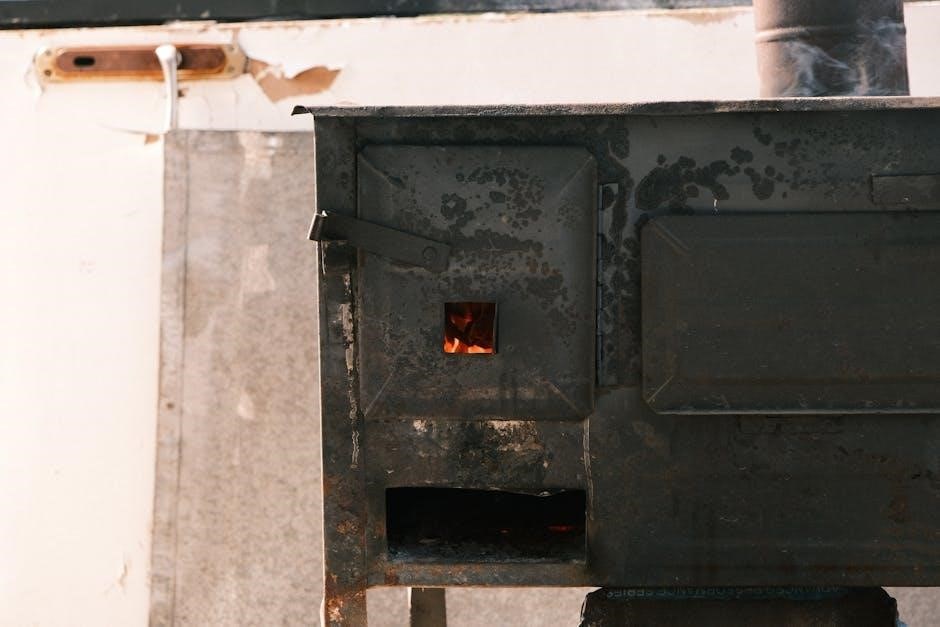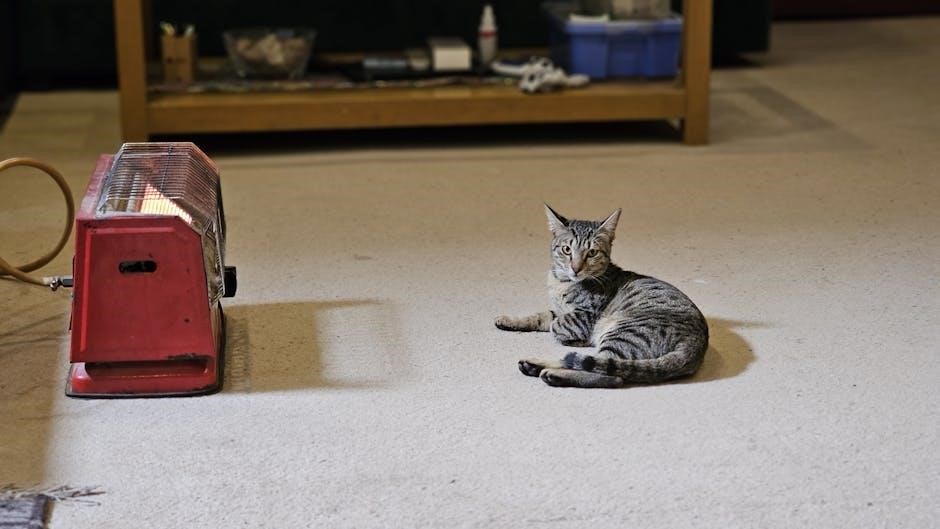pelonis heater manual
Get the official Pelonis heater manual for easy setup, maintenance, and troubleshooting tips. Download your guide now!
Pelonis heaters are trusted for their quality, safety, and efficiency, offering a range of models like oil-filled radiators, ceramic, and fan-forced heaters designed for reliable heating solutions.
1.1 Overview of Pelonis Heater Models
Pelonis offers a variety of heater models, including oil-filled radiators, ceramic, fan-forced, and infrared quartz heaters. Each model is designed for specific heating needs, ensuring efficiency and safety. The oil-filled radiators provide steady, long-lasting heat, while ceramic heaters deliver quick warmth. Fan-forced models circulate air for even heat distribution, and infrared quartz heaters offer targeted heating. Manuals for each model are available online, detailing features, operation, and safety guidelines to ensure optimal performance and user safety.
1.2 Importance of Reading the Manual
Reading the Pelonis heater manual is crucial for safe and efficient operation. It provides essential safety precautions, operating instructions, and troubleshooting tips. The manual ensures users understand the heater’s features, proper usage, and maintenance requirements. It also highlights potential hazards and solutions, preventing misuse that could lead to damage or safety risks. By following the manual, users can optimize heater performance, extend its lifespan, and ensure compliance with warranty terms. It serves as a comprehensive guide for achieving maximum comfort and safety while using the heater.

Key Components of the Pelonis Heater
Pelonis heaters feature essential components like advanced heating elements, thermostats, fans, and safety sensors. These parts ensure efficient heating, temperature control, and safe operation, making them reliable and user-friendly.
2.1 Understanding the Heater’s Design
Pelonis heaters are designed with safety and efficiency in mind, featuring advanced components like ceramic heating elements, oil-filled radiators, and fan-forced systems. Their compact, portable designs make them ideal for various spaces. Many models include overheat protection, tip-over switches, and programmable thermostats to ensure reliable operation. The sleek, ergonomic construction allows for easy mobility and placement. These heaters are built to provide consistent warmth while maintaining energy efficiency, making them a practical choice for home and office use.
2.2 Identifying Controls and Features
Pelonis heaters come with user-friendly controls, including digital thermostats, timers, and multiple heat settings. Many models feature remote controls for convenient operation. LED displays provide clear temperature readings, while safety features like overheat protection and tip-over switches ensure safe usage. Some heaters include programmable timers and eco modes to optimize energy use. Understanding these controls and features helps users maximize efficiency and comfort while operating their Pelonis heater effectively.

Safety Precautions
- Avoid touching hot surfaces to prevent burns.
- Keep combustible materials away from the heater.
- Do not use in moist areas like bathrooms.
- Never submerge the heater in water.
- Ensure proper ventilation for safe operation.
3.1 General Safety Guidelines
Always follow essential safety guidelines when using Pelonis heaters to ensure safe operation and prevent potential hazards. Keep the heater away from water and moisture, as this can lead to electric shock. Avoid placing combustible materials near the unit, and never touch hot surfaces to prevent burns. Ensure proper ventilation in the room to maintain airflow and efficiency. Unplug the heater when not in use or during cleaning. Adhere to these guidelines to enjoy a safe and comfortable heating experience with your Pelonis heater.
3.2 Avoiding Common Hazards
To ensure safe operation, avoid common hazards such as overheating by keeping the heater away from flammable materials. Never use damaged cords or extension cords, as they can cause electrical issues. Avoid exposing the heater to water or moisture, such as in bathrooms or laundry areas. Do not leave the heater unattended or running for extended periods without supervision. Always follow the manufacturer’s guidelines and avoid modifying the heater in any way. These precautions help prevent accidents and ensure reliable performance.

Installation and Setup
Proper installation ensures safe and efficient heating. Place the heater on a flat, stable surface away from water sources. Plug directly into a wall outlet.
4.1 Choosing the Right Location
Choosing the right location for your Pelonis heater is crucial for safety and efficiency. Ensure the heater is placed on a stable, flat surface, away from flammable materials and water sources. Avoid installing it in bathrooms or laundry areas due to moisture risks. Keep it at least 3 feet away from curtains or furniture to prevent fire hazards. Always follow the manufacturer’s guidelines for optimal placement and safety.
4.2 Electrical Connections and Requirements
Always plug your Pelonis heater directly into a wall outlet to ensure safe operation. Avoid using extension cords or power strips, as they may cause electrical issues. The heater requires a dedicated circuit to prevent overload. Check the manual for specific voltage and wattage requirements to match your home’s electrical system. Never modify the plug or cord, as this can lead to fire or shock hazards. Ensure the outlet meets the heater’s power specifications for reliable performance.

Operating the Heater
Plug in the heater, turn the thermostat knob to your desired setting, and press the power switch to start. It operates in heating or fan-only modes for comfort.
5.1 Starting the Heater
To start the heater, plug it directly into a wall outlet, ensuring it’s on a stable, flat surface. Set the thermostat to your desired temperature using the control knob. Press the power switch to turn it on. The heater will begin operating, providing warmth. Always ensure the area is clear of combustible materials. Follow the manual’s instructions for optimal performance and safety.
5.2 Adjusting Settings and Thermostat
To adjust the settings and thermostat on your Pelonis heater, press the UP or DOWN buttons to set your desired temperature between 40°F and 95°F. The thermostat will maintain the selected temperature, ensuring consistent warmth. For energy efficiency, set the thermostat to a moderate temperature level. Always follow the manual’s instructions for optimal performance and safety.

Maintenance and Troubleshooting
Regularly clean the heater and ensure proper ventilation. Turn off and unplug the unit before cleaning. If issues arise, refer to the manual for troubleshooting steps.

6.1 Cleaning and Upkeep Tips

Regular cleaning is essential for optimal performance. Turn off and unplug the heater before cleaning. Use a soft cloth to wipe dust from the exterior and vents. Avoid harsh chemicals or water, as they may damage the unit. Ensure all surfaces are cool before cleaning. For models with filters, check and clean them as instructed in the manual. Proper upkeep prevents dust buildup and ensures efficient heating. Always follow the manual’s specific cleaning guidelines to maintain safety and functionality.
6.2 Common Issues and Solutions
Like any appliance, Pelonis heaters may occasionally face issues. If the heater shuts down, ensure it’s plugged directly into a wall outlet. For overheating, unplug, wait 10 minutes, and restart. If it doesn’t turn on, check the thermostat and power source. Loud noises may indicate debris; clean vents or replace faulty parts. Refer to the manual for specific troubleshooting steps. Addressing issues promptly ensures safe and efficient operation. Always follow the manufacturer’s guidelines for resolving problems to maintain performance and safety.
Warranty and Support
Pelonis heaters are backed by a comprehensive warranty and dedicated customer support. For assistance, contact 1-866-646-4332 or email customersupport@pelonis.com. Visit their website for detailed support options and warranty information.
7.1 Understanding the Warranty
The Pelonis heater warranty provides coverage for manufacturing defects, ensuring product reliability. The warranty period varies by model, typically covering parts and labor for up to five years. Registration may be required for extended coverage. Always refer to the manual for specific terms and conditions. Damage from misuse or unauthorized repairs may void the warranty. For details, visit the Pelonis website or contact customer support at 1-866-646-4332.
7.2 Contacting Customer Support
For assistance with your Pelonis heater, contact customer support at 1-866-646-4332 or email customersupport@pelonis.com. Visit their website for FAQs, manuals, and warranty details. The support team is available to address troubleshooting, repair requests, or general inquiries. Ensure to have your product model and serial number ready for efficient service. Pelonis customer support is committed to resolving issues promptly and providing helpful solutions to ensure optimal product performance and user satisfaction.

Energy Efficiency and Usage Tips
Pelonis heaters are designed for energy efficiency. Use thermostats to maintain optimal temperatures, reducing unnecessary energy use. Regular maintenance ensures peak performance and lowers consumption.
8.1 Optimizing Heater Performance
To maximize efficiency, ensure proper airflow by keeping the heater away from obstructions. Regularly clean filters and heat elements to maintain performance. Adjust the thermostat to desired temperatures and use timers for energy-saving operation. For models with multiple heat settings, choose the lowest necessary to reduce energy consumption. Avoid overheating by monitoring room temperature. Proper maintenance, like cleaning and inspecting components, ensures optimal functionality; Refer to the manual for specific tips tailored to your Pelonis heater model.
8.2 Reducing Energy Consumption
To minimize energy use, set the thermostat to a moderate temperature, typically around 68°F. Turn off the heater when not in use or when the room is unoccupied. Utilize energy-saving modes or features like timers to limit operation. Regular cleaning ensures efficient performance. Avoid overheating spaces, as this wastes energy. Proper insulation and sealing drafts help maintain warmth, reducing the need for constant heating. Choose the right heater size for your space to avoid excessive energy use.

